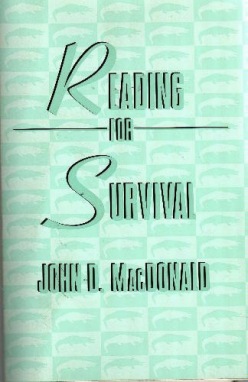By Kevin Comer
In 1928 at the age of 12, JDM—then known as Jack—contracted Scarlet Fever, a life-threatening disease common in children caused by the bacterium, Streptococcus pyogenes. Young Jack’s infection was made doubly serious by accompanying Mastoiditis, a painful and sometimes deadly inflammation of the air pockets in the skull behind the ears. Today, Scarlet Fever and Mastoiditis are treated with antibiotics, but in 1928, bedrest and the body’s own defenses were the only treatments available. JDM was in bed for a year.
During that year of solitary confinement, JDM developed two signature lifelong habits. He became a voracious reader, reportedly tearing through both classics and pulps. And he became comfortable with being alone. He later wrote: “I entertained myself with the exercise of imagination.”
Not bad preparation for becoming a writer, but eventually JDM came to believe reading broadly was an essential habit of the educated citizen that was increasingly underdeveloped by the education system and generally unappreciated by society. In Free Fall in Crimson (1981), JDM has Meyer deliver his take on the state of literacy in America when Travis surprises him upon his smiling return from a stroll on the beach by asking: “Back a winner?”
“Oh, good afternoon! A winner? In a sense, yes. There was a gaggle of lanky young pubescent lassies on the beach, one of the early invasions of summer, all of them from Dayton, Ohio, all of them earnest, sunburnt, and inquisitive. They were huddled around a beached sea slug, decrying its exceptional ugliness, and I took a hand in the discussion, told them its life pattern, defensive equipment, normal habitat, natural enemies, and so on. And I discovered to my great pleasure that this batch was literate! They had read books. Actual books. They had all read Lives of a Cell and are willing to read for the rest of their lives. They’d all been exposed to the same teacher in the public school system there, and he must be a fellow of great conviction. In a nation floundering in functional illiteracy, sinking into the pre-chewed pulp of television, it heartens me to know that here and there are little groups of young-uns who know what an original idea tastes like, who know that the written word is the only possible vehicle for transmitting a complex concept from mind to mind, who constantly flex the muscles in their heads and make them stronger. They will run the world one day, Travis. And they won’t have to go about breaking plate glass and skulls and burning automobiles to express themselves, to air their frustrations. Nor will these children be victimized by the blurry nonsense of the so-called social sciences. The muscular mind is a cutting tool, and contemporary education seeks to take the edge off it.”
When I read passages like this, I’m certain JDM must be spinning in his grave.
We owe JDM’s belief in the value and power of the written word for our last glimpse of Meyer and Travis McGee, whom he enlisted as evangelists in proselytizing the essential necessity of literacy in understanding the world and our place in it. In 1985, he wrote “Reading for Survival” as a contribution to the Literary Heritage of the States program of the Library of Congress’ Center for the Book at the request of Jean Trebbi, then executive director of the Florida Center for the Book. It was Trebbi who asked why he didn’t couch his ideas in the form of a conversation between Meyer and McGee when he reported he was struggling with the essay. He responded: “Why indeed…I am very sorry for taking so damn long.”
When JDM finally submitted the work, he provided this preface: “The theme will be the terrible isolation of the nonreader, his life without meaning or substance because he cannot comprehend the world in which he lives.” He added: “The best way to make my words fall usefully upon deaf ears is to use such colorful language that it will be quoted, sooner or later, to a great many of the nonreaders.”
In “Reading for Survival,” Travis and Meyer engage in a broadranging conversation over the course of a number of days which ultimately focuses on the role of reading in developing the understanding necessary to survive—and flourish—in our increasingly complex world. It is perhaps less a conversation than an informal lecture delivered in bits and pieces as Meyer expands upon the topic which begins with musings on the nature of ideas and the forces shaping human evolution.
We’re not used to Meyer going on at such length and some points of reference are a bit dated. Nonetheless, this is our last visit aboard the Busted Flush; the last time T. McGee and Meyer share Boodles on the rocks in a pair of big old-fashioned glasses; and the last time we share the Lauderdale beach with Travis keeping himself in shape and Meyer firmly rooted to his towel—the last sunny day together with McGee and Meyer, friends forever.
I take solace in the knowledge that the subscribers to Travis McGee & Me are all readers and do not need me to quote the colorful language required by nonreaders. Click here to enjoy the final appearance of Travis McGee and Meyer in “Reading for Survival.”

